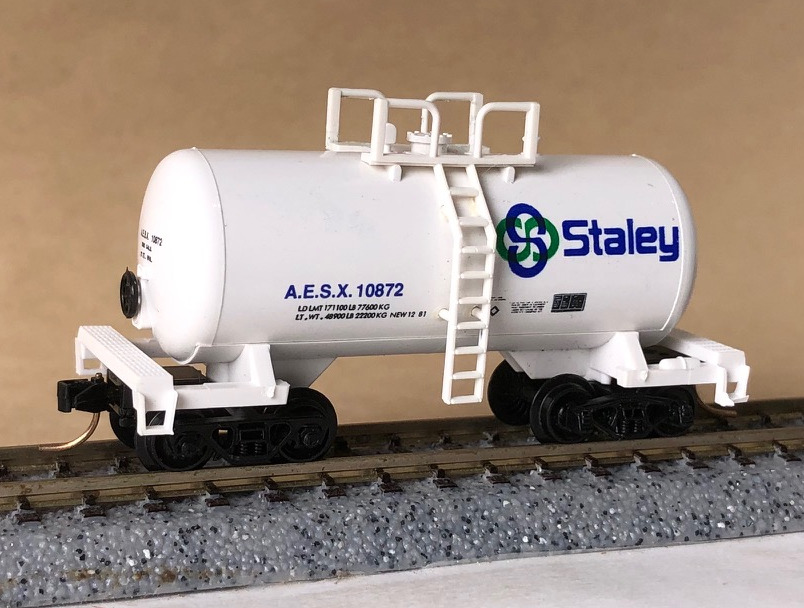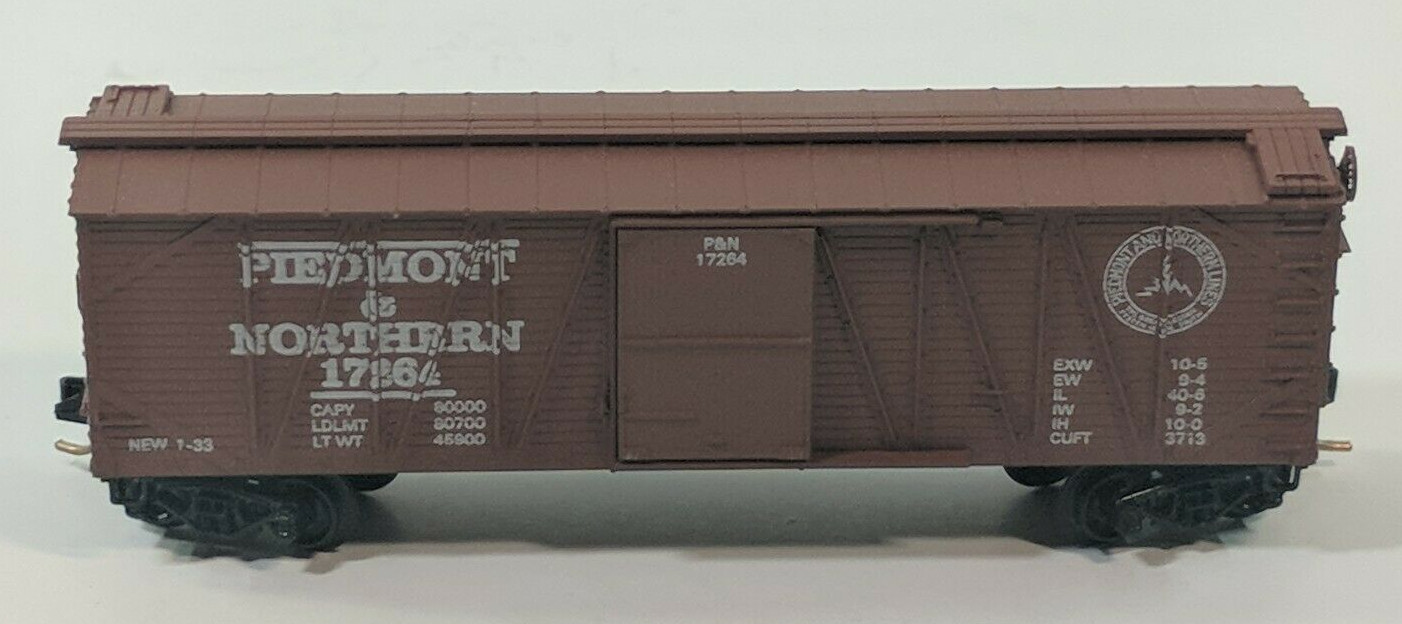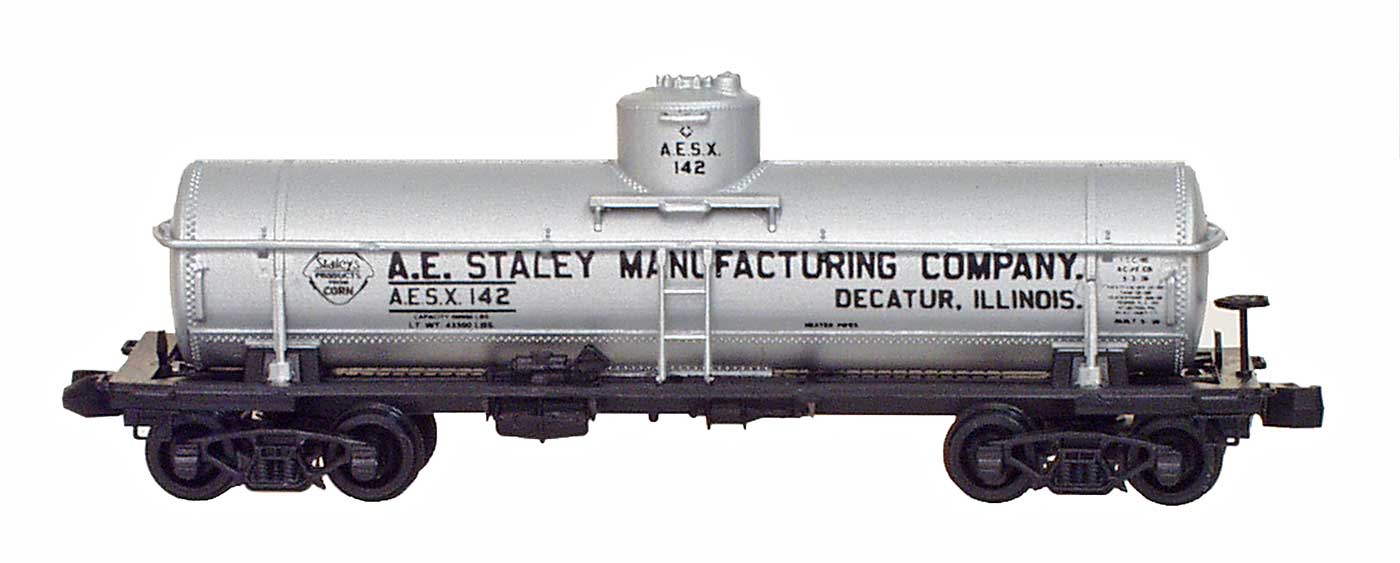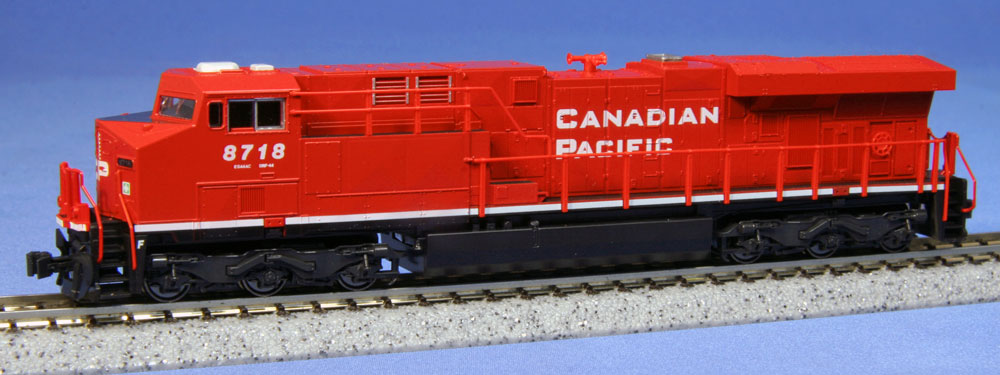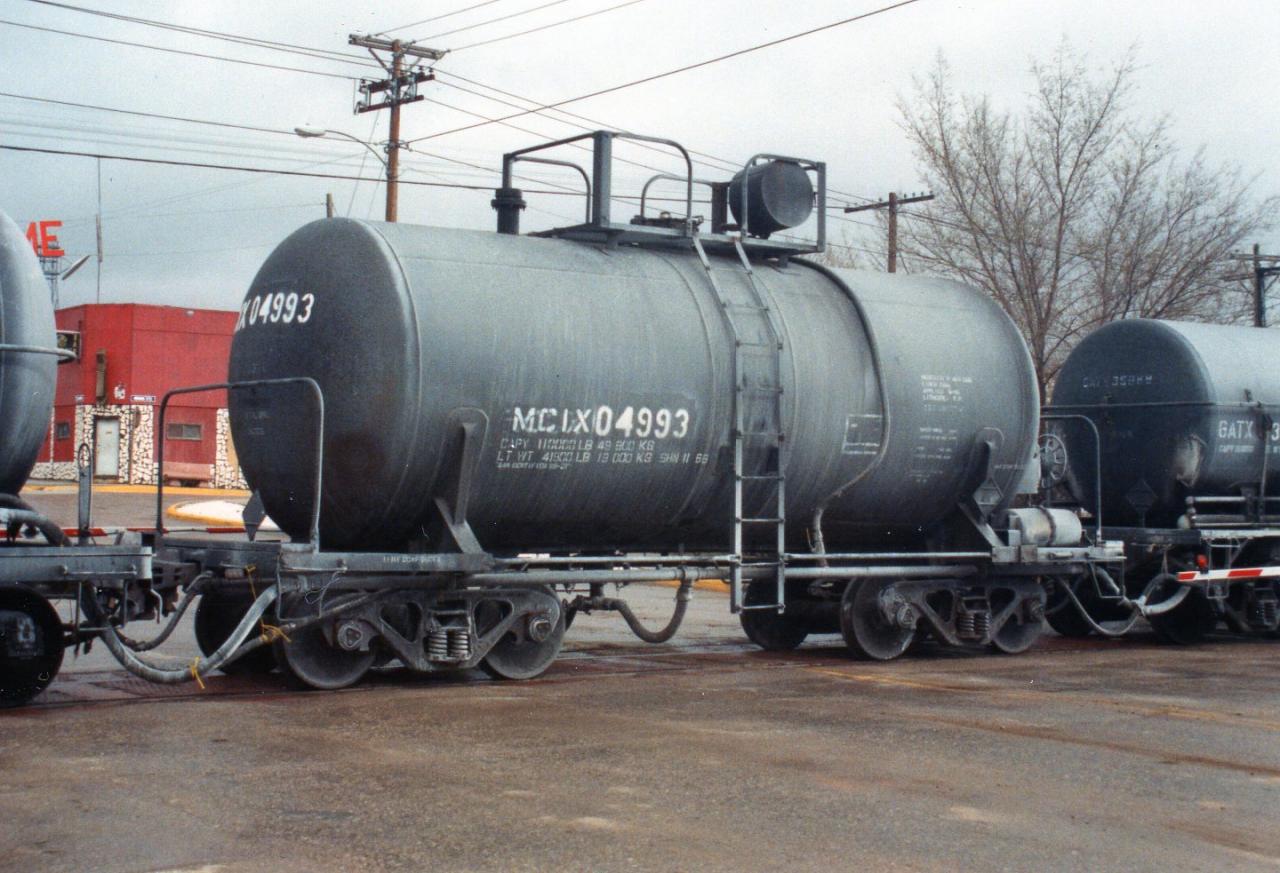Model Information: This body style is MDC's knock-off version of the tremendously successful Atlas 29' Beercan tank car. Given that the tooling is about 20 years newer than the Atlas version, this car is actually the better model of the two. Details like the stirrup steps really highlight the improvements in the injection molded plastic industry. The printing is very high grade and the trucks and couplers are higher quality than the contemporaneous Atlas releases. Unfortunately, MDC never ran very many versions of this car and Athearn, so far, has neglected to re-release the cars under their own name since the acquisition of MDC by Athearn in 2004.
The first release of this car (with the 4-digit product code) was available in kit form. Do not be scared off by this if your modeling skills are not great. The car assembles without any glue or paint. You simply need to attach the frame to the body (using friction), add the ladders (again with friction) and then simply pop in the trucks. The later (5-digit product code) release were made and assembled in China as RTR (Ready-to-Run) models.
The first release of this car (with the 4-digit product code) was available in kit form. Do not be scared off by this if your modeling skills are not great. The car assembles without any glue or paint. You simply need to attach the frame to the body (using friction), add the ladders (again with friction) and then simply pop in the trucks. The later (5-digit product code) release were made and assembled in China as RTR (Ready-to-Run) models.
Prototype History: These cars transport higher value commodities which typically are shipped in smaller amounts. One example is corn syrup. Some carry petroleum refining catalysts, sulfuric acid and sodium hydroxide. The typically ride on roller bearing trucks with 33 inch wheels.
Road Name History:  Augustus Eugene Staley (25 February 1867 - 26 December 1940) founded a sales company for food starch in Baltimore in 1898. On 6 November 1906, he incorporated his starch business that he had created in Baltimore, Maryland in order to start the production of food starch. In 1909 Mr. Staley purchased an inoperative cornstarch plant in Decatur, IL. He paid $45,000 and spent three years rebuilding and upgrading the plant with capital that he had raised from stockholders. The factory began processing on March 12, 1912.
Augustus Eugene Staley (25 February 1867 - 26 December 1940) founded a sales company for food starch in Baltimore in 1898. On 6 November 1906, he incorporated his starch business that he had created in Baltimore, Maryland in order to start the production of food starch. In 1909 Mr. Staley purchased an inoperative cornstarch plant in Decatur, IL. He paid $45,000 and spent three years rebuilding and upgrading the plant with capital that he had raised from stockholders. The factory began processing on March 12, 1912.
The company has produced many famous household brands including Staley Pancake and Waffle Syrup, Sta-Puf fabric softener, and Sta-Flo liquid starch. The two latter brands were subsequently sold to Dial.
A. E. Staley Manufacturing was one of the largest processors of corn in the United States, second only to the Archer Daniels Midland Corporation, also based in Decatur, Illinois. It also processed soybeans under a partnership agreement with Archer Daniels Midland at its Decatur, Illinois plant. Archer Daniels Midland, through a subsidiary, owned 7.4% of A.E. Staley and often time, Archer Daniel Midland would assist A.E. Staley with filling corn syrup order for CPC international when the company was in short supply of product. Both companies also had joint ventures producing corn sweeteners in Central America.
In 1985, A. E. Staley purchased CFS Continental, a wholesale grocery company, for $360 million. A. E. Staley stated a need to diversify away from bulk food processing. After the acquisition, A. E. Staley changed its name to Staley Continental.
In 1988, British company Tate & Lyle acquired 90% of A. E. Staley for $1.42 billion. Prior to the purchase, Tate & Lyle announced that it planned to sell CFS Continental to SYSCO, another wholesale grocer, for $700 million to help fund the acquisition. In 2000, Tate & Lyle acquired the remaining 10% of A. E. Staley.
From Wikipedia

The company has produced many famous household brands including Staley Pancake and Waffle Syrup, Sta-Puf fabric softener, and Sta-Flo liquid starch. The two latter brands were subsequently sold to Dial.
A. E. Staley Manufacturing was one of the largest processors of corn in the United States, second only to the Archer Daniels Midland Corporation, also based in Decatur, Illinois. It also processed soybeans under a partnership agreement with Archer Daniels Midland at its Decatur, Illinois plant. Archer Daniels Midland, through a subsidiary, owned 7.4% of A.E. Staley and often time, Archer Daniel Midland would assist A.E. Staley with filling corn syrup order for CPC international when the company was in short supply of product. Both companies also had joint ventures producing corn sweeteners in Central America.
In 1985, A. E. Staley purchased CFS Continental, a wholesale grocery company, for $360 million. A. E. Staley stated a need to diversify away from bulk food processing. After the acquisition, A. E. Staley changed its name to Staley Continental.
In 1988, British company Tate & Lyle acquired 90% of A. E. Staley for $1.42 billion. Prior to the purchase, Tate & Lyle announced that it planned to sell CFS Continental to SYSCO, another wholesale grocer, for $700 million to help fund the acquisition. In 2000, Tate & Lyle acquired the remaining 10% of A. E. Staley.
From Wikipedia
Brand/Importer Information:  MDC Roundhouse was founded in California in 1938 and relocated in 1993 to Carson City, Nevada due to statewide restrictions on painting. MDC Roundhouse was a producer of both RTR (Ready-to-Run) and kit versions of N Scale rolling stock as well as RTR locomotives. They entered the N scale market in 1979 with a Thrall Hi-Side Gondola and a Hi-Cube Single Door Box Car. MDC Roundhouse was purchased by Horizon Hobbies in June of 2004, when its owner since 1938 C. H. Menteer retired, and merged into their Athearn line.
MDC Roundhouse was founded in California in 1938 and relocated in 1993 to Carson City, Nevada due to statewide restrictions on painting. MDC Roundhouse was a producer of both RTR (Ready-to-Run) and kit versions of N Scale rolling stock as well as RTR locomotives. They entered the N scale market in 1979 with a Thrall Hi-Side Gondola and a Hi-Cube Single Door Box Car. MDC Roundhouse was purchased by Horizon Hobbies in June of 2004, when its owner since 1938 C. H. Menteer retired, and merged into their Athearn line.
Unlike many of their contemporaries which contracted with European firms to produce their products, MDC made their own toolings. They made several popular body styles and produced them for road names that many other vendors (even Micro-Trains) wouldn't touch. This made them popular with modelers. Also, their un-assembled "kits" permitted a lower price point so they were popular with "runners" as well as "modelers".
Of particular interest was the attention given to modern 50 foot steel boxcars. They made some attempt to accurately mold the differences into distinct models to represent each of the major prototype manufacturers products. They have distinct toolings not only for the different products from FMC, BFF and PS, but also multiple models for each of these manufacturers including "standard" vs "Youngstown" doors and "waffle" vs. "rib" sides. In total they produced 13 different versions of the 50 foot steel boxcar.

Unlike many of their contemporaries which contracted with European firms to produce their products, MDC made their own toolings. They made several popular body styles and produced them for road names that many other vendors (even Micro-Trains) wouldn't touch. This made them popular with modelers. Also, their un-assembled "kits" permitted a lower price point so they were popular with "runners" as well as "modelers".
Of particular interest was the attention given to modern 50 foot steel boxcars. They made some attempt to accurately mold the differences into distinct models to represent each of the major prototype manufacturers products. They have distinct toolings not only for the different products from FMC, BFF and PS, but also multiple models for each of these manufacturers including "standard" vs "Youngstown" doors and "waffle" vs. "rib" sides. In total they produced 13 different versions of the 50 foot steel boxcar.
Item created by: gdm on 2016-10-15 09:41:46. Last edited by gdm on 2020-12-17 20:52:10
If you see errors or missing data in this entry, please feel free to log in and edit it. Anyone with a Gmail account can log in instantly.
If you see errors or missing data in this entry, please feel free to log in and edit it. Anyone with a Gmail account can log in instantly.


